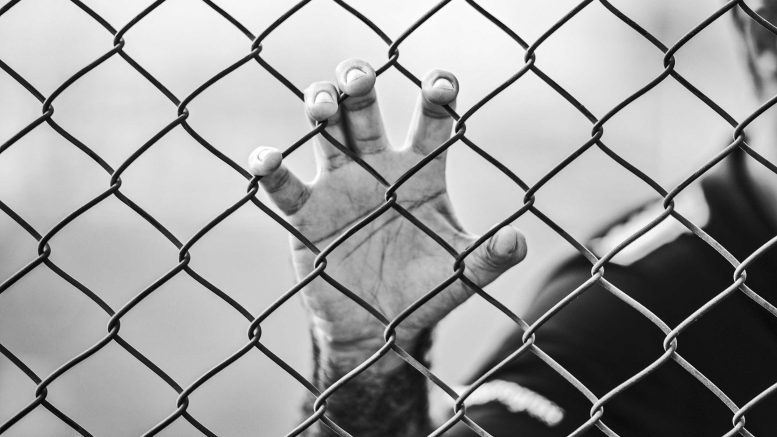It takes a constitutional amendment followed by a statewide vote to legalize balloting behind bars. Will it happen?
By Bobbi Murray, Capital & Main
This story is produced by the award-winning journalism nonprofit Capital & Main and co-published here with permission.
“I think democracy thrives when everybody can participate,” says California Assemblymember Isaac Bryan (D-Culver City). In February Bryan introduced a groundbreaking state constitutional amendment that would allow the approximately 115,000 inmates incarcerated in California prisons to vote in local, state and national elections.
Bryan is advancing the legislation, Assembly Constitutional Amendment 4, at a time when many states are making it harder for citizens to vote. He calls it a needed pushback in an era of concerted campaigns in many states to limit participation by Black and other voters of color. In late February Georgia passed a measure banning absentee dropboxes and expanding the ability of Georgians to question the residency of their neighbors and their right to vote.
The Sentencing Project found that African Americans are currently disenfranchised at a rate 3.5 times higher than non-African Americans. Incarceration rates have something to do with it — according to one study, Black Americans are incarcerated at a rate nearly five times that of whites. Latinx persons are locked up in state prisons at 1.3 times the rate of whites.
Under current California law, nobody behind prison bars can vote, although they can participate thereafter. Eleven states have enacted measures that hinder the ability to vote for those who have already served their time. In 2018, Florida voters supported suffrage for ex-felons (excluding those convicted of murder or sex crimes), but the Legislature quickly responded by requiring felons to pay court fees before being able to vote, a move many interpreted as a means to keep them from voting.
In other states lawmakers have supported initiatives to enfranchise the formerly incarcerated. Texas and Tennessee are contemplating measures to restore voting rights, as are Minnesota and New Mexico. A bill in Nebraska would reinstate voting rights upon the completion of a sentence.
California would not be the first state in the nation to support a suffrage measure for the incarcerated — Vermont and Maine grant voting rights to those in prison.
* * *
But Bryan’s bill faces considerable obstacles. The constitutional amendment requires a two-thirds vote by the state Legislature, no easy feat, after which it would go onto a ballot statewide.
Criticism of Bryan’s measure was immediate. Tom Lackey, a Republican assemblymember representing the high desert and the Antelope Valley north of metropolitan Los Angeles, has emerged as an early opponent, tweeting, “I will vote NO on #ACA4 when the #CALeg Assembly Committee on Elections hears it because prisoners should never be able to cast votes from their cells. I refuse to dismiss the voice of the victim.”
The California Correctional Peace Officers Association, the union that represents prison guards, has not yet taken a public position. Should it oppose, its history of hefty campaign contributions could influence legislators’ votes.
Moreover, California’s debate over prisoner suffrage is likely to coincide with the 2024 presidential and state contests — and is likely to churn up acrimony about crime and criminal justice. One longtime adviser to the California Democratic Party, commenting on background, summarized a likely voter position: “The Legislature should focus on the needs of Californians who are not in prison.”
* * *
Bryan frames his initiative as “a conversation we need to have now more than ever. It would force people to think differently about linkages between disenfranchisement and chattel slavery. It would force people to think differently about the history of suffrage in this country from allowing black people to vote, women to vote, nonproperty owners, nonwhite men, everybody to participate in the process.”
The big picture, he says, is that “we’re living in a time where voting rights are being curtailed in various states across the country. Texas and others have introduced nearly two dozen bills to restrict access to the polls, access to participating in democracy. In California we have a responsibility to continue to lead.”
The ability for the incarcerated to vote connects directly to the present push for electoral racial equity — and the push to address historical inequity, says Adrianne Shropshire, co-founder and executive director of BlackPAC, an organization that engages with Black voters on policy issues.
“Creative efforts to disenfranchise Black Americans are as American as apple pie, right?,” says Shropshire. Whether it is Jim Crow or voter ID policies, there’s a constant effort to disenfranchise Black Americans and take away our citizenship rights.”
Antoinette Ratcliffe, executive director of L.A.-based Initiate Justice, one of the organizations rallying in support of ACA4, says that allowing incarcerated persons to vote creates a connection with the communities in which the incarcerated have family and friends. Voting and civic participation forges stronger ties, she says.
Bryan is approaching the fight to pass ACA4 one step at a time. “My hope is that if there is an opposition to this, that opposition will wait to reveal itself until we are on the ballot. Because I think an attempt to undermine the ability for California voters to even have their say is an attempt to undermine democracy as a whole.”
Copyright 2023 Capital & Main


Be the first to comment on "California considers giving the incarcerated a right to vote"